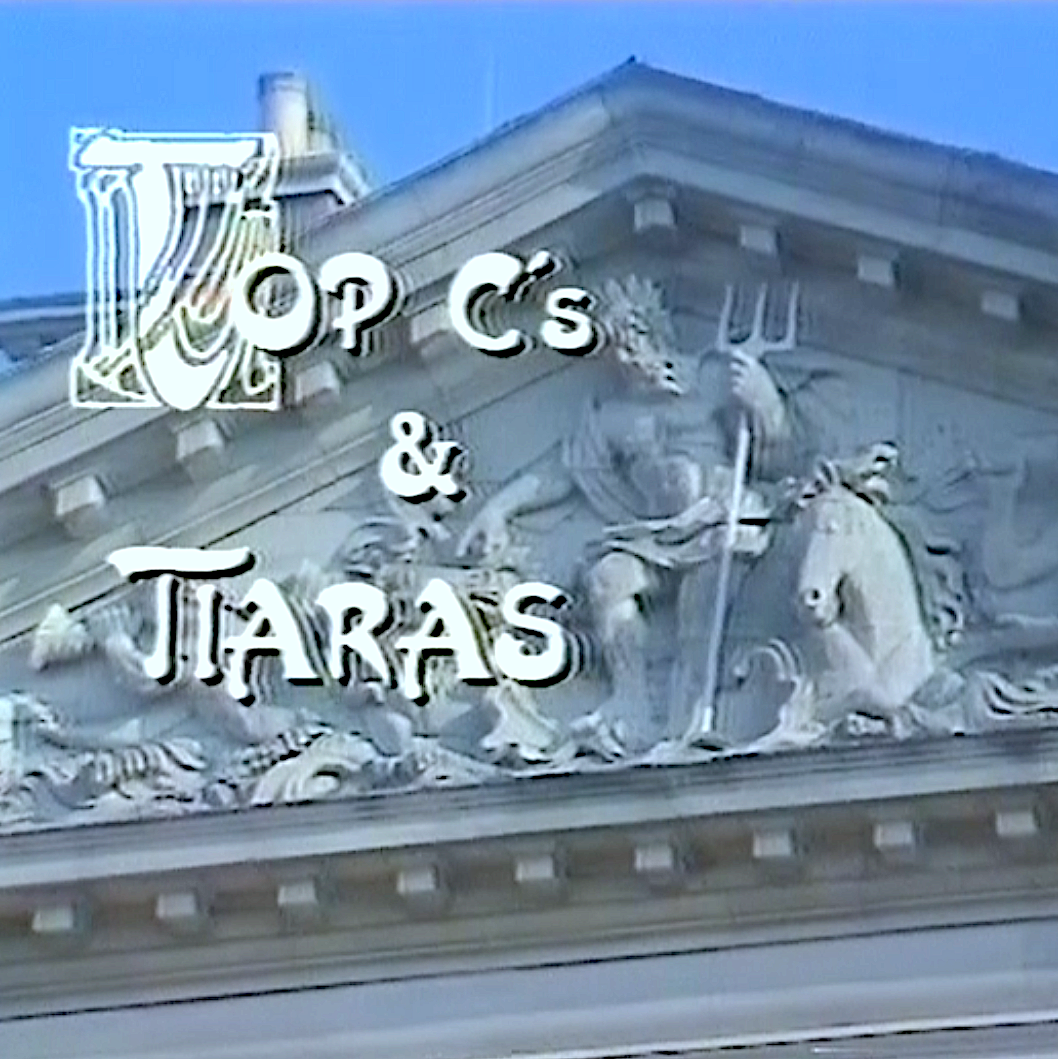The Top C's storyAimed at middle-of-the-road viewing audiences and a family show and with the emerging video markets it was devised for secondary sales. We believed people would buy videos and CDs (not just record VHS tapes from transmission) as they would make ideal gifts, popular, light classical music.
When Channel 4 first came on-air there was almost an over-supply of more radical music for younger audiences and we saw the niche, an audience that was not being catered for. |
The first special was on a modest budget recorded on location at some famous London sites, whilst based at the Warwick Arts Trust in Pimlico and also at Olympic Sound Studios. With great viewer response and excellent ratings we were commissioned to produce a second special also on location, still using the Warwick Arts Trust but this time Odyssey Sound Studios.
Benjamin Luxon being a household name was a natural casting [when his schedule allowed] and a huge favourite. Peter Morrison (baritone) and Marilyn Hill Smith (soprano) would be an important part of the ensemble, our team of vocal artists (the four voices, soprano, mezzo, tenor, baritone). Marilyn well known as “Britain’s Queen of Operetta' and Peter, a much-loved and popular singer particularly throughout Scotland. We then had a different tenor and mezzo soprano for each show. Julia Migenes was a rising star well known in Germany, France, other European countries and in America. Top C's was an appropriate vehicle to introduce Julia to the UK.
We knew we'd created a winning formula and were quickly commissioned to do the Series, but the tough problem was where? We needed a great location as a base. We couldn't otherwise continue to do as many numbers to fill the one hour at such a variety of different set-ups and manage the quick turn-arounds on such a modest budget for such a show. It would also be a logistical nightmare moving orchestras around different places. All sound had to be recorded live in all set-ups.
The slightly wild, apparently ah-hoc style was one of the key selling-points which audiences seemed to enjoy with artists popping-up all over the place to sing something else. When operetta was usually performed it was within a proscenium arch in a theatre or a concert venue. Our show liberated the staging and instantly modernised a genre of music usually associated with times 50 or 100 years ago.
This format could not be done by the BBC or ITV. Simply, a show that requires a 30+ orchestra would have to be recorded in studio, theatre or concert hall - a more controlled environment - but with the new lightweight equipment we were able to liberate from studio and work entirely with OB units.
Another big challenge was that the turn-around time. It would have to tighten if we were going to record one show per week to bring it in on-budget. The solution was found at Wrotham Park which became our home for the duration. We recorded each Friday, Saturday, and Sunday, a three-day shoot for each one-hour show. (By contrast, a studio couldn't be booked for three days every week to deliver a show on this scale on this budget.)
The Byng family (owners of Wrotham Park) were wonderfully accommodating, hospitable and became our friends for the duration. Everyone knew we were working to a near-impossible schedule each week, but the fun and excitement was intense, often electric, so everybody knuckled-down. The momentum built each weekend ending with the main orchestral recordings on Sunday evenings.
Each show used 40 to 50 song titles within the hour programme within a medley, part of a different arrangement, or as the full song. In itself, this was quite an achievement to get this amount of material 'cleared', get the musical arrangements done, routined, then rehearsed, then recorded, and, this happened every week. Barcud production facilities were astonishing, not only the camera crew and the Outside Broadcast units, but also in post-production back at base in Caernarfon, Wales.
This operetta series was devised to have a secondary exploitation as a video-collection, CD collection, and was designed to run into several series. The repertoire was strong enough to sustain without any dilution. We had built a strong ensemble, production team, and established a method to deliver this winning formula ongoing. For Channel 4's political reasons they decided against continuing with this ratings hit.
Viewers who recorded our shows on their VHS had a hard time separating a particular song because of 'split-edits' and 'overlays' which is why everything on YouTube has a messy ending or beginning, or are clipped. This, of course would be overcome if we were to digitise these recordings and re-edit, and perhaps make them available either on DVD or to stream on one of the subscription-based services.
Benjamin Luxon being a household name was a natural casting [when his schedule allowed] and a huge favourite. Peter Morrison (baritone) and Marilyn Hill Smith (soprano) would be an important part of the ensemble, our team of vocal artists (the four voices, soprano, mezzo, tenor, baritone). Marilyn well known as “Britain’s Queen of Operetta' and Peter, a much-loved and popular singer particularly throughout Scotland. We then had a different tenor and mezzo soprano for each show. Julia Migenes was a rising star well known in Germany, France, other European countries and in America. Top C's was an appropriate vehicle to introduce Julia to the UK.
We knew we'd created a winning formula and were quickly commissioned to do the Series, but the tough problem was where? We needed a great location as a base. We couldn't otherwise continue to do as many numbers to fill the one hour at such a variety of different set-ups and manage the quick turn-arounds on such a modest budget for such a show. It would also be a logistical nightmare moving orchestras around different places. All sound had to be recorded live in all set-ups.
The slightly wild, apparently ah-hoc style was one of the key selling-points which audiences seemed to enjoy with artists popping-up all over the place to sing something else. When operetta was usually performed it was within a proscenium arch in a theatre or a concert venue. Our show liberated the staging and instantly modernised a genre of music usually associated with times 50 or 100 years ago.
This format could not be done by the BBC or ITV. Simply, a show that requires a 30+ orchestra would have to be recorded in studio, theatre or concert hall - a more controlled environment - but with the new lightweight equipment we were able to liberate from studio and work entirely with OB units.
Another big challenge was that the turn-around time. It would have to tighten if we were going to record one show per week to bring it in on-budget. The solution was found at Wrotham Park which became our home for the duration. We recorded each Friday, Saturday, and Sunday, a three-day shoot for each one-hour show. (By contrast, a studio couldn't be booked for three days every week to deliver a show on this scale on this budget.)
The Byng family (owners of Wrotham Park) were wonderfully accommodating, hospitable and became our friends for the duration. Everyone knew we were working to a near-impossible schedule each week, but the fun and excitement was intense, often electric, so everybody knuckled-down. The momentum built each weekend ending with the main orchestral recordings on Sunday evenings.
Each show used 40 to 50 song titles within the hour programme within a medley, part of a different arrangement, or as the full song. In itself, this was quite an achievement to get this amount of material 'cleared', get the musical arrangements done, routined, then rehearsed, then recorded, and, this happened every week. Barcud production facilities were astonishing, not only the camera crew and the Outside Broadcast units, but also in post-production back at base in Caernarfon, Wales.
This operetta series was devised to have a secondary exploitation as a video-collection, CD collection, and was designed to run into several series. The repertoire was strong enough to sustain without any dilution. We had built a strong ensemble, production team, and established a method to deliver this winning formula ongoing. For Channel 4's political reasons they decided against continuing with this ratings hit.
Viewers who recorded our shows on their VHS had a hard time separating a particular song because of 'split-edits' and 'overlays' which is why everything on YouTube has a messy ending or beginning, or are clipped. This, of course would be overcome if we were to digitise these recordings and re-edit, and perhaps make them available either on DVD or to stream on one of the subscription-based services.
Neil Anthony


